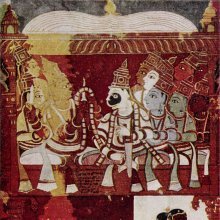Tiruvallur, Tiruvaḷḷūr: 2 definitions
Introduction:
Tiruvallur means something in Hinduism, Sanskrit, the history of ancient India. If you want to know the exact meaning, history, etymology or English translation of this term then check out the descriptions on this page. Add your comment or reference to a book if you want to contribute to this summary article.
Images (photo gallery)
In Hinduism
Vaishnavism (Vaishava dharma)
Source: Acta Orientalia vol. 74 (2013): Historical sequence of the Vaiṣṇava DivyadeśasTiruvaḷḷūr (or Puṇyāvarttavīkṣāraṇyakṣetra) refers to Evvuḷ, one of the 108 Vaishnava Divya Desam (divyadeśas or divyasthalas), located in the topographical division of Toṇṭaināṭu (“Northern Tamil Nadu”), according to the 9th century Nālāyirativviyappirapantam (shortly Nālāyiram).—Tradition would record the Vaiṣṇava divyadeśas or divyasthalas are 108. The divyadeśa is a base of the cult of Viṣṇu in Viṣṇuism [Vaiṣṇavism] tradition. The list of 108 [viz., Tiruvaḷḷūr] seems to have reached maturation by about the early 9th century CE as all the deśas are extolled in the hymns of the twelve Āḻvārs.

Vaishnava (वैष्णव, vaiṣṇava) or vaishnavism (vaiṣṇavism) represents a tradition of Hinduism worshipping Vishnu as the supreme Lord. Similar to the Shaktism and Shaivism traditions, Vaishnavism also developed as an individual movement, famous for its exposition of the dashavatara (‘ten avatars of Vishnu’).
India history and geography
Source: Wikipedia: India HistoryTiruvallur refers to one of the eight Taluks of Chingleput.—Chingleput district was a district in the Madras Presidency of British India. It covered the area of the present-day districts of Kanchipuram and Tiruvallur and parts of Chennai city. Chingleput district was made of eight taluks [e.g., Tiruvallur-taluk (Headquarters: Tiruvallur)] [...]

The history of India traces the identification of countries, villages, towns and other regions of India, as well as mythology, zoology, royal dynasties, rulers, tribes, local festivities and traditions and regional languages. Ancient India enjoyed religious freedom and encourages the path of Dharma, a concept common to Buddhism, Hinduism, and Jainism.
See also (Relevant definitions)
Full-text (+8): Chingleput, Purippakkam, Akkarappakkam, Iluppur, Thirumalisai Alvar, Koppur, Madurantakam, Saidapet, Ponneri, Conjeevaram, Maduravasal, Ramancheri, Guruvayal, Karanai Nizampattu, Kilambakkam, Punnappakkam, Amidanallur, Perumudivakkam, Pattaraipperumbudur, Punyavarttaviksharanyakshetra.
Relevant text
Search found 5 books and stories containing Tiruvallur, Tiruvaḷḷūr, Tiruvallūr; (plurals include: Tiruvallurs, Tiruvaḷḷūrs, Tiruvallūrs). You can also click to the full overview containing English textual excerpts. Below are direct links for the most relevant articles:
Pallava period (Social and Cultural History) (by S. Krishnamurthy)
Appendix: List of Temples of Pallava Period
Topography, Geography and Geology of the Region (Tondaimandalam) < [Chapter 1 - Introduction]
Sources for Study < [Chapter 1 - Introduction]
Later Chola Temples (by S. R. Balasubrahmanyam)
Temples in Perambakkam < [Chapter II - Temples of Kulottunga I’s Time]
Temples in Narasingapuram < [Chapter II - Temples of Kulottunga I’s Time]
Temples in and around Madurantakam (by B. Mekala)
Rise of Feudatories (in Tondaimandalam) < [Chapter 1 - Historical Backdrop]
Rule of the Nawabs of the Carnatic < [Chapter 1 - Historical Backdrop]
Middle Chola Temples (by S. R. Balasubrahmanyam)
Temples in Kuvam < [Chapter IV - Temples of Rajendra I’s Time]
The Idyll of Ecard < [March-April 1935]
